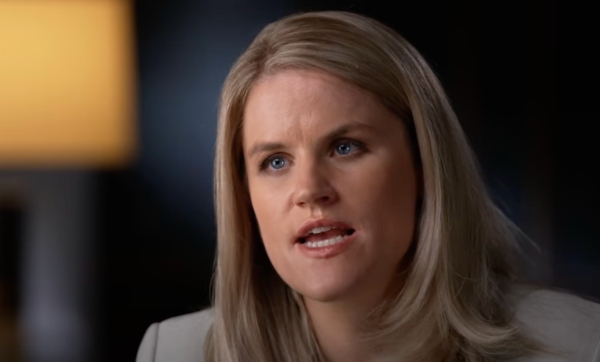Facebook whistleblower: GOP frenemy or foe?
11/02/2021 / By News Editors

In the past few weeks, media outlets and liberal commentators have seized on revelations from former Facebook employee-turned-whistleblower Frances Haugen as proof that the social media giant, far from censoring conservative voices, is actually profiting from playing them up.
(Article by Susan Crabtree republished from RealClearPolitics.com)
They’ve used Haugen’s testimony before Congress and the thousands of internal Facebook documents she leaked to dismiss complaints about anti-conservative bias among Big Tech platforms. The argument now is that Facebook wasn’t doing enough to censor conservative voices after the 2020 presidential election and should have cracked down on information circulating on the platform before the Jan. 6 attack on the Capitol.
But new evidence unearthed by Haugen, a onetime product manager at Facebook, tells a different story. The Wall Street Journal this week reported on internal Facebook debates showing that politics was often at the center of Facebook’s decision-making and that employees regularly targeted conservative sites, with more senior employees waving off any red flags raised by the rank-and-file. “The documents viewed by the Journal, which don’t capture all of the employee messaging, didn’t mention equivalent debates over left-wing publications,” the WSJ reported.
Leaked documents also show that tools called “sparing sharing” and “informed engagement,” designed to reduce what Facebook deemed disinformation, were allowed to remain in use despite findings that they disproportionately impacted conservative news sites.
As the debate over Facebook’s profit model and policies plays out in the public, conservatives continue to report account suspensions or deletions and odd coincidences surrounding them by a variety of big social media platforms, including YouTube, Facebook and Twitter.
In early October, the campaign for Virginia gubernatorial candidate Terry McAuliffe, a Democrat, sent out a fundraising email complaining about a “shadowy” organization called the American Principles Project dumping money into political ads opposing him. One day later, YouTube suspended the APP’s ability to post videos, according to the group’s government affairs director, Jon Schweppe.
There was no warning before YouTube shut down the account, which is a violation of the streaming media platform’s three-strikes policy, Schweppe said during a recent conference call with Wisconsin Sen. Ron Johnson and groups focused on fighting technology companies’ censorship practices. After media inquiries, YouTube said APP, which is mainly focused on public education reform, was suspended for re-sharing videos from the banned account of former Trump adviser Steve Bannon, whom the Democratic-controlled House of Representatives last week held in contempt of Congress for defying a Jan. 6 inquiry subpoena. YouTube reinstated APP’s account but did so with a warning.
Across the country, Facebook abruptly dropped a page for Reopen California Schools, which is run by parents critical of school COVID lockdown policies and has 18,000 followers. Facebook has never explained its ban, said Jonathan Zachreson, the group’s founder. Zachreson soon learned that Facebook took down several other pages for school-reopening groups around the country within days of his group being shut down.
Rattled by the abrupt action, Zachreson contacted California state Assemblyman Kevin Kiley, as well as several news reporters. After inquiries from Kiley and the media, Facebook re-posted the Reopen California School page, as well as those of similar groups, and cited “human error” for the shutdowns.
Zachreson would like a better explanation and ultimately more accountability for Facebook and other tech giants. His group and another that opposes school mask and vaccine mandates in California were shut down the same week. The timing coincided with developments in their joint legal case against the state of California over the student mask mandate.
“Normally, if your Facebook group goes down, you get an alert as the administrator, and you can look and see what [the complaint] is and appeal,” Zachreson told RealClearPolitics. “For me, they didn’t provide that.”
Earlier in the month, Republican Senate candidate and retired Army Capt. Sam Brown vowed revenge against Twitter after his account was “permanently suspended” with no explanation. Twitter has since acknowledged it was an error. Brown is running in the GOP primary in Nevada, hoping to challenge Democratic Sen. Catherine Cortez Masto next year.
Dan Gainor, vice president of a conservative group called Free Speech America, says Big Tech platforms’ claims of mistakenly dropping conservative accounts is par for the course, occurring regularly without consequence so they keep doing it.
“It’s a classic Sundar Pichai response: ‘Oh, we have had a technical problem. We accidentally took down [hundreds of conservative] accounts,'” he said during the recent Zoom strategy session with conservative groups and Sen. Johnson. Gainor was referring to Google’s chief executive.
Free Speech America, an offshoot of the conservative Media Research Center, tracks technology companies’ suspension or deletion of conservative accounts on social media and has cited more than 2,800 instances. A recent report by the group found that Big Tech companies have targeted GOP members of Congress at a ratio of 53 to 1 compared to their Democratic colleagues.
For years, Republicans from former President Trump on down have complained about Silicon Valley’s liberal bias and Big Tech’s dangerous monopolistic control on information. While that consensus is well established, the right remains deeply fractured on exactly what to do about it, and Haugen’s whistleblowing is exacerbating those fissures.
Some, including Trump — who was de-platformed from Facebook, Twitter, and Instagram earlier this year — believe the only real answer to combating Silicon Valley’s liberal bias is providing alternative social media venues. Trump last week announced that he is launching his very own social media network called “TRUTH Social” in order to “stand up to the tyranny of Big Tech.”
Others are applauding Haugen’s whistleblowing, heralding the evidence she helped uncover that Facebook has repeatedly manipulated user data for its own gain and knowingly harms teens. They hope her testimony and documents will jump-start plans to regulate Facebook and other platforms or at least dismantle their monopolies.
“It is clear that Facebook prioritizes profit over the well-being of children and all users,” Sen. Marsha Blackburn, a Tennessee Republican, remarked during Haugen’s testimony before a Senate subcommittee in early October. Blackburn said she and Sen. Richard Blumenthal, a Connecticut Democrat who chairs the panel, are working on legislative ideas to address the problems.
But others on the right are deeply suspicious of Haugen’s end goals, casting her as Trojan horse for more censorship.
“I think this whistleblower we had from Facebook — it’s all a ruse, and [Democrats] are trying to entice Republicans into joining legislation that would complete the censorship of conservative thought on social media,” Johnson said during the Zoom meeting. “I don’t see Democrats participating in legislation that would actually fix the problem. We have to rely on the private sector to do this.”
Dan Bongino, a right-wing radio show host and podcaster, recently implored conservatives not to fall into Haugen’s “trap,” which he labeled a “scam” and a “left-wing op.” Conservative commentator and editor Ben Shapiro also warned against any bipartisan measures springing from Haugen’s testimony. Shapiro’s Daily Wire underscored his message by reporting on Haugen’s numerous political contributions to Democrats in recent years.
Still, some Republicans remain hopeful that Haugen’s revelations have finally lifted the curtain on opaque Facebook policies, which they say is providing more momentum in Washington to rein in Big Tech – but only for measures Democrats will back.
Florida GOP Rep. Greg Steube filed legislation aimed at curbing online censorship the same week Twitter permanently banned Trump. Steube’s legislation would reform Section 230 — a controversial section of the Communications Decency Act providing liability protections to media companies — by instituting a market dominance test. The bill would set new limits on media companies’ liability that would only apply to the biggest companies, not startups trying to compete with them.
With Democrats controlling the House and Senate, the Florida lawmaker acknowledges the legislation is going nowhere. Republicans, he said, will have to gain control of the House and Senate next November before they can expect reforms to Section 230 to gain traction.
Still other conservatives argue that Big Tech critics shouldn’t give up hope on passing legislation in the near term. The Haugen testimony, regardless of the whistleblower’s motives, is spurring Democrats to scrutinize Facebook and other platforms more closely and back new regulations aimed at reining them in.
“I would separate the whistleblower from the evidence,” Mike Davis, the founder and president of the conservative Internet Accountability Project, told RCP. “The documents speak for themselves. Facebook is clearly preying on the broader phobias of teenage girls for profit.”
Davis, a former top Senate Judiciary Committee aide when Sen. Chuck Grassley was chairman, is backing an antitrust measure that aims to curtail Big Tech companies’ marketplace power. The law would bar large platforms from leveraging their dominance in one market to gain dominance in another, as Google does when it places its in-house restaurant reviews above Yelp’s in its search results. Amazon also uses third-party transactions on its site to market its own products to consumers.
Grassley and Minnesota Democrat Amy Klobuchar are sponsoring the Senate bill as companion legislation to a House Judiciary measure. Since the legislation was announced in early October, the measure has won the support of a diverse bipartisan group of a dozen senators, including Democrats Dick Durbin, Cory Booker, and Richard Blumenthal as well as Republicans Lindsey Graham, John Kennedy, and Josh Hawley. Several mid-size tech companies, including Spotify, Roku, Match Group and DuckDuckGo, have also publicly endorsed it.
“There’s a unique alliance between progressives and conservatives. Progressives don’t like Big Tech because they’re big, and conservatives don’t like Big Tech because they censor conservatives,” said Davis, who has been suspended from Twitter four times since founding the Internet Accountability Project. “The answer is not for Congress [to pass] more regulation; it’s to break up these Big Tech monopolies operating on century-old antitrust laws.”
“There’s a very good chance that two or three, maybe even four of these [antitrust bills] will become law over the next year,” he predicted.
Read more at: RealClearPolitics.com
Tagged Under: biased, big government, Big Tech, Censorship, conservatives, conspiracy, corruption, cyberwar, deception, Facebook, Frances Haugen, GOP, politics, progressives, Social media, tech giants, traitors, Whistleblower
RECENT NEWS & ARTICLES
COPYRIGHT © 2018 TECHGIANTS.NEWS
All content posted on this site is protected under Free Speech. TechGiants.news is not responsible for content written by contributing authors. The information on this site is provided for educational and entertainment purposes only. It is not intended as a substitute for professional advice of any kind. TechGiants.news assumes no responsibility for the use or misuse of this material. All trademarks, registered trademarks and service marks mentioned on this site are the property of their respective owners.





















